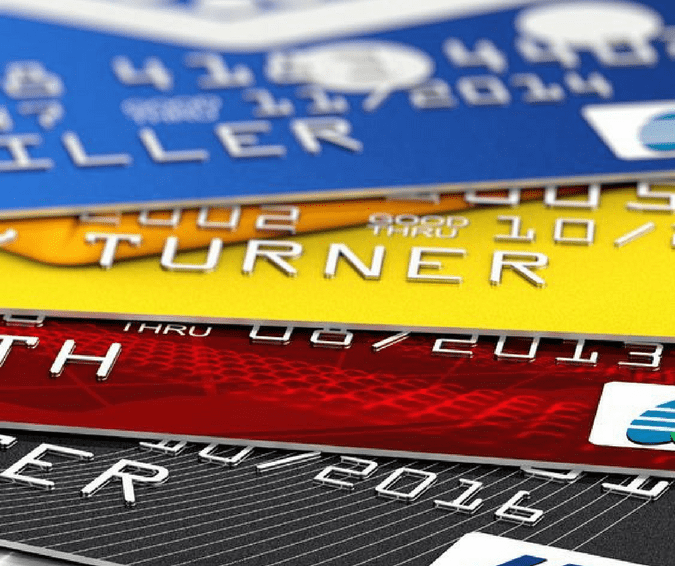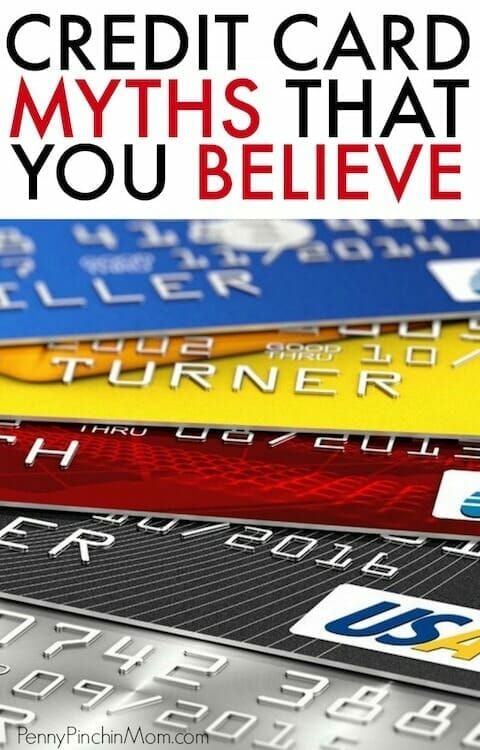Before the mid-1990’s, credit cards were somewhat of a novelty. Many people had them in case of emergencies, but they rarely ever used them. When you went into a store and paid with your card, the cashier (and most people in line behind you) would groan. The cashier had to take out a clunky device, slide a carbon paper over the card to make a couple of different copies, and then the retailer submitted it for payment.
It was a cumbersome process. However, improvements on phone lines and internet have switched the roles of credit cards and checks. Now if you pull out your checkbook, people will groan that you’re holding up the line. The point is, credit cards are still a relatively new commodity. And with something new comes much understanding.
Other helpful money saving articles:
- How to Break the Cycle of Credit Card Debt
- How You Can Improve Your Credit Score (Even Without a Credit Card)
- The Key To Negotiating Credit Card Interest Rates
CREDIT CARD MYTHS YOU STILL BELIEVE
There are a lot of credit card myths that people believe. Here are a few.
You MUST Carry a Balance to Boost Your Credit Score
Shortly after I turned 18, I got my first credit card. I had several friends tell me that to build my credit score faster I should start carrying a small balance (just a few dollars each month). One had even heard it from his mom who works at a local bank.
Some quick research showed this myth did nothing more than waste money on interest. Your credit score is not based upon your debt, but your use and responsibility with paying your debts.
Paying your card off every month can improve your score more than carrying a long-term balance.
A Lower Limit Boosts Your Credit Score
One of the items that FICO looks at when determining your score is how much of your monthly limit you use. Your core is not based on your credit limit.
For instance, if your card has a $1,000 limit, and you charge $990 every month, you are using 99% of your limit. However, if your card has a $10,000 limit and you charge $990 per month, you are only using 9.9% of your available credit.
The lower the percentage that you use, the less risk of default you pose, thus the higher your credit score.
I Need to Pay Only the Minimum
Technically this is correct; you only need to pay the minimum. However, this is a foolish decision due to the outrageously high interest charged on credit cards. Also, it may hurt your credit score.
Notice the example above; if you max out your card, and then you only pay the minimums, you are keeping your balance near 100% of your limit. A high percentage, especially for an extended period of time, means your score could go down.
They Aren’t Safe
With news coming in every few months about the latest retailer who was hacked and your information may have been compromised, it is easy to believe that credit cards are not safe. If you are traveling, credit cards can be a better option.
If you have $1,000 cash and it is stolen, you are out that money. If you have no cash and only a credit card, you can cancel the card, and you will not be liable for any fraudulent purchases.
Would you rather be out $1,000, or out the hour or two to cancel your card and file a fraud claim?
Traveling with Your Credit Card
Most people know that traveling with a credit card is a good idea. Not only do you rack up rewards points, but you also get some perks that you wouldn’t otherwise get when you pay with cash. Some of the perks include:
- Free auto insurance. Did you know that when you pay with your credit card, you will likely get the rental agency’s extended coverage for free? If you pay for it, you are paying for something you already get for free.
- Free travel insurance. Many cards offer free travel insurance. It covers you in case your luggage is lost and possibly other misadventures.
- Free hotels. Certain cards offer perks where if you have an overnight layover, they will cover the cost of your hotel.
- Free Travel Planning. Most cards offer a concierge service that people rarely use. If you have a trip coming up but no time to plan it, just call and have your card company arrange the details.
- Free Airline Ticket. Many cards that are offered by major airlines offer a companion ticket. Once per year you pay for your ticket (at full price) and a companion can fly for free (just pay taxes).
- Free checked bag. If you used your airline card to purchase your tickets, you might be entitled to a free checked bag.
- Free Airport Lounge. Some airline cards will allow you access to these exclusive lounges in the airports.
- Free extended warranty. Traveling or not, many cards will give you a free extended warranty on big purchases. If the item is lost, stolen, or broken you can get it replaced for free (even if the manufacturer’s warranty has expired).
- Free fraud protection. The biggest perk of any credit card is that you aren’t liable for fraudulent purchases. Most will be wiped from your card the instant you call in. They are removed permanently if the investigation determines that you aren’t responsible.
According to Credit.com, some of the best rewards cards include: Discover It Card, Citi Double Cash Back Card, Capital One Venture and Chase Freedom Unlimited.
Wrapping it Up
Credit cards are wrought with myths. For some reason many people are still suspicious about how they work and if they are actually going to help them. Those who embrace the card, and are responsible for their spending, can get some free rewards and perks. As usual, check with your card to see which perks are offered.
How do you use your credit card? Have you taken advantage of all that it has to offer?
Scott Sery is a contributing writer for Card Journalist where he writes about everything dealing with credit cards including how to use them to travel for almost free.

